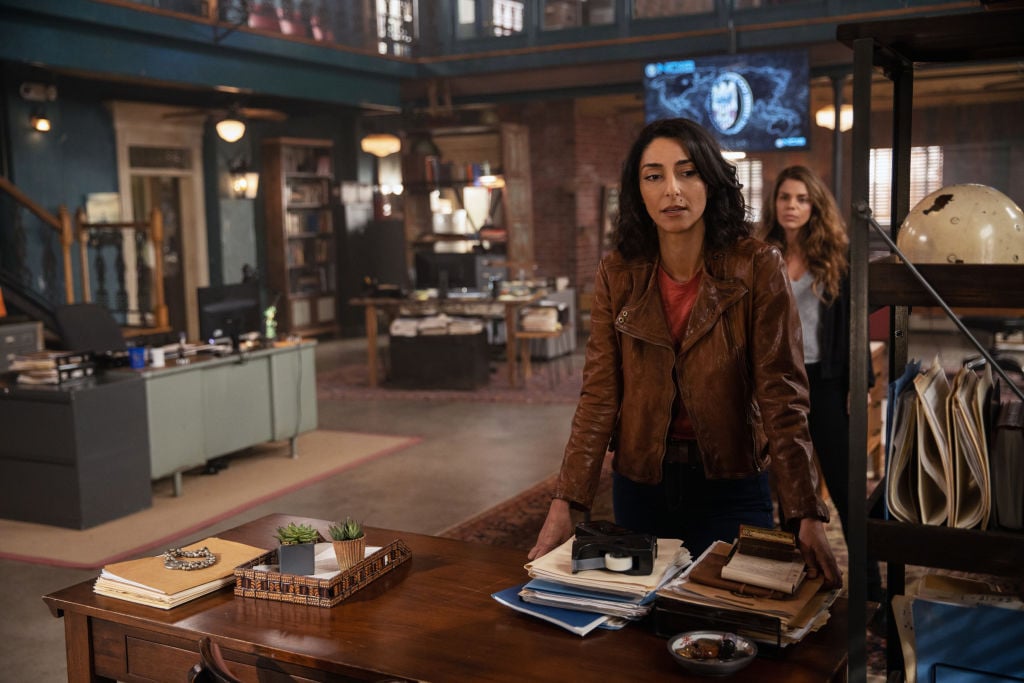‘NCIS: New Orleans’: Necar Zadegan Talks About Hannah’s Mission and the ‘True Danger’ Behind Van Cleef
The final episode of NCIS: New Orleans filmed before production shut down due to the coronavirus (COVID-19) pandemic. “Predators” allowed Special Agent Hannah Khoury (Necar Zadegan) to spread her wings and take on bigger issues at hand. Here’s why the Hannah-heavy season-ender is a must-see.
[Spoilers from NCIS: New Orleans Season 6 Episode 20 below]
‘Predator’s tackles a real-world issue affecting women

Season 6 of NCIS: New Orleans hasn’t given Hannah as much attention as fan favorite, Lucas Black, or resident nerd, Sebastian Lund. “Predators” changed that. The episode focused on Hannah as she uncovered Deputy Director Van Cleef’s (Richard Thomas) past.
What she found is a history of inappropriate behavior toward female agents and she knew from personal experience. An informant’s identity leaked years before. Van Cleef blamed Hannah, but he’s the real traitor.
When Hannah gave him the ultimatum to resign or she’d speak out so he couldn’t be promoted to Chief of Naval Operations, he resigned. However, the end of the episode revealed Van Cleef at Hannah’s house and he’s not backing down.
Zadegan’s storyline in “Predators” vaguely mirrors that of the real-world trial of Associate Justice of the Supreme Court of the United States Brett Kavanaugh.
Much like Van Cleef, Kavanaugh’s alleged misconduct was made public via Christine Blasey Ford, according to USA Today. We can’t help but wonder what would’ve come of this if not for the COVID-19 shutdown.
Zadegan explains why Van Cleef is so dangerous
Zadegan was ready for this storyline for NCIS: New Orleans. In a recent interview with TV Insider, she explained why Van Cleef, and others like him, are a danger to women — specifically Hannah. However, that danger forces her to rise up and face her fears which is something many can relate to.
“It becomes something for the character of Hannah that she suddenly realizes is bigger than her. A lot of what moves her as the story progresses is the realization of the responsibility moving outside of just herself into something that’s affecting so many other people,” she said.
“Then she has to decide whether or not to take that risk because the risks are great, like you said. They’re definitely probably going to affect her career because they already have.”
She continued: “Her livelihood has been attacked, her reputation has been attacked, but she has this little girl that she has to take care of and puts those things aside and on the back burner and swallows her pride because of this great responsibility and great love she has for her family.”
This, Zadegan added, is pivotal, specifically in terms of the big picture.
“It’s only when she recognizes the true danger of a man like this in his position that she decides to risk it all for this greater good.”
The actors shot two different options for tackling one particular scene
With a topic so sensitive yet timely, Zadegan explained the care involved with taking it on. In an interview with Parade, she said they shot two different options for the episode-ending confrontation.
“One is more career-focused in terms of how the conversation will play out in terms of how the danger is, and one is a little more physically focused in terms of the confrontation becoming that much more personal,” she said.
The actress touched on discussions about “gender roles” and “the perspective of a woman and a man.” She added that “even the most progressive man can be so unaware of the legitimate fear that can exist in a woman all of a sudden, even coming from a man not trying to instill that fear necessarily.”
It’s good to see that even procedural dramas can take on big issues with sensitivity, bringing necessary conversations to the surface.


